Parents and children always should have clear boundaries – parents will protect, guide, and take care of their children and their needs, and children will focus on their growth, development, and focus. So what happens when the lines get blurred or the roles are reversed? Parentification. That’s what happens. But what is parentification?
Parentification can have several negative effects on a child’s psyche and emotional development. Children who are parentified deal with the after-effects for the rest of their life and are seemingly never able to move on from their dysfunctional childhood.
Being a responsible and mature child is a good thing, but having to take on the role of the parent is not something they should ever have to do.
So, what is parentification and what does it look like? Let’s find out!
Related: Parentification: Healing From The Trauma Of Having To Grow Up Too Soon
What Is Parentification?
Parentification happens when the roles of the parent and child get reversed, i.e., the child has to become the parent and take care of the needs of their parents, instead of it being the other way round. The child’s needs become secondary and even optional sometimes, as they are exploited to fulfil the parent’s needs and demands.
What the child needs and expects from their parents ceases to matter, and they are increasingly neglected. Despite being just a child, they have taken on the parental role and also take on many responsibilities meant for grown-ups, even if they are not equipped emotionally and psychologically for that.
All these experiences and circumstances leave them with parentification trauma, and they are left to pick up the pieces of their shattered and tired soul even after their parents pass away.
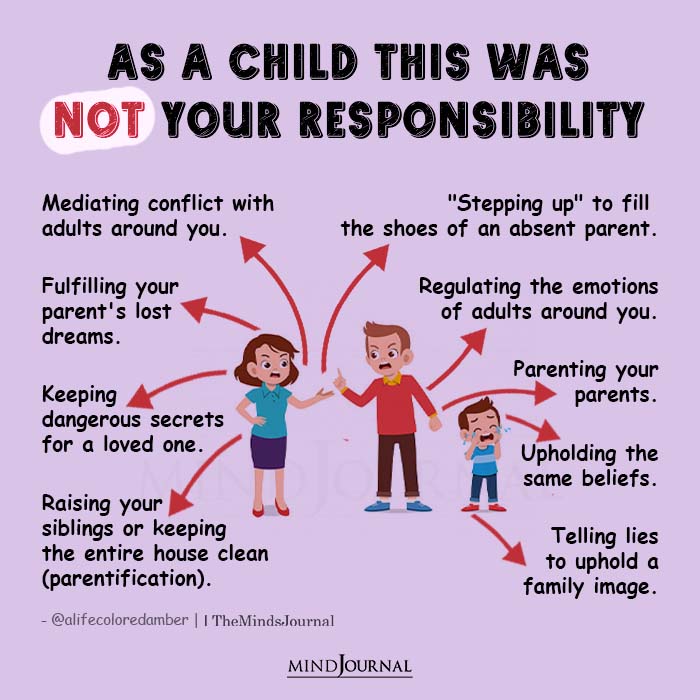
Signs Of Parentification
The following are the signs you were parentified as a child, and knowing these might help you understand it better and deal with it healthily in the long run.
- You grew up knowing that you have to be mature and responsible for everyone around you.
- You were convinced from a very young age that you should not ask for help, and do everything on your own.
- You never really knew what it meant to be a kid.
- Your efforts were never acknowledged or appreciated.
- You often got complimented by others for being “very responsible and mature for your age.”
- You were the one who always tried to take care of your parent’s problems instead of it being the other way around.
- You always felt like you had to be the mediator in every conflict.
- You suffered from depression and anxiety as a child.
- You had emotionally immature and self-absorbed parents.
- You had to cook for yourself and your siblings, otherwise, you would have nothing to eat.
- You were always the one who had to attend Parent-Teacher meetings for your younger siblings, not your parents.
- You suppressed a lot of your emotions, opinions, and thoughts to avoid upsetting your parents.
- You have a hard time relying on other people and believe in being extremely self-reliant.
- You like the feeling of being a caretaker and provider, even if it means you have to sacrifice your own happiness for it.
- You are filled to the brim with empathy and can easily connect with others and understand their pain.
Related: What Is Codependent Parental Neglect?
What Are The Types Of Parentification?
There are two types of parentification – emotional and instrumental. However, sometimes they can also occur at the same time.
In a normal child-parent relationship, it’s the parent who needs to provide emotional support in the form of love, understanding, guidance, and affection, along with instrumental support like food, shelter, education, and financial security.
But in the case of parentification, none of this is experienced by children and this is how it looks like when the roles reverse.
Emotional Parentification
Emotional parentification happens when a child is forced to take care of their parent’s emotional needs, and if they don’t, they are shamed and made to feel guilty about it. In case there is more than one child in a family, the parentified child more often than not turns out to be the most compassionate, sensible, vulnerable, and sensitive among all.
This type of parentification is the most damaging of the two and can have far-reaching negative consequences for a child, like emotional parentification trauma.
Some examples of emotional parentification are as follows:
- You have to endure listening to one parent constantly criticizing the other, and complaining about them.
- You are coerced into keeping their secrets.
- You are always made to be a part of adult discussions and issues.
- You take on the role of your parent, be it your mother or father, whenever they’re absent.
- You always have to act as the peacemaker between your parents, in case of disagreements and conflicts.
- You are asked for advice and guidance by your parent/parents for whatever problems they face.
- You are your parent’s biggest, and most probably, the only confidante.
Instrumental Parentification
Instrumental parentification happens when a child is directly or indirectly forced to take up age-inappropriate responsibilities and chores, normally meant for their parents. Such responsibilities should never be a child’s responsibility because it’s much more advanced than their ability and comprehension.
Even though it’s normal to try and make a child responsible from a young age, dumping parental responsibilities is not okay in any universe.
When a child has to take up important, grown-up responsibilities from a very young age, they internalize the narrative that only they can take care of themselves and the people around them, and that they don’t deserve to be taken care of.
Some examples of instrumental parentification are as follows:
- You are responsible for taking yourself and your siblings to the doctor.
- You end up paying the bills for everything, be it household bills, medical bills, or your siblings’ education bills.
- You have to take care of your parent’s physical, emotional, mental, and psychological needs.
- You have to take on the role of a parent if your parent is an addict.
- You are always the one who has to take care of your sick parents and siblings.
- You perform almost all the important household chores, such as cooking, cleaning, paying bills, dropping your siblings to school, grocery shopping, etc.
- You have responsibilities on your shoulders that are not at all age-appropriate for you.
Related: When Parents Offer Gaslighting Instead of Love: Surviving Your Own Mother and Father
Effects Of Parentification
Parentification can have so many negative effects on the mind, confidence, and happiness of a child. When you don’t get to experience healthy parental love and affection, you grow up seeing the world in a much different and skewed way, compared to children belonging to normal families.
So, what are the effects of parentification?
1. You never got to experience life as a kid.
This is one of the worst and saddest after-effects of parentification. Because you had to act like a grown-up from a very young age, you were deprived of a happy childhood, where you could enjoy life as a child without any worries and responsibilities.
In the process of taking care of everything and everyone, you lost yourself and your child-like innocence very early on in life.
The impact of this can be seen in your adulthood too. You find it hard to be spontaneous, be trusting of other people, depend on them, or just let loose. You have become so used to being the mature and sorted one, that it’s hard for you to let go sometimes.
2. You see your own needs as unnecessary, unimportant, and a burden.
From a very young age, you have internalized the narrative that what you want and need does not matter at all, and your dysfunctional parents might even have contributed to that feeling.
You are sensitive to other people’s needs and never to your own. You have no problem sacrificing your happiness for the betterment of your parents. This might be a noble thing to do in the case of normal relationships, but not if you have dysfunctional parents.
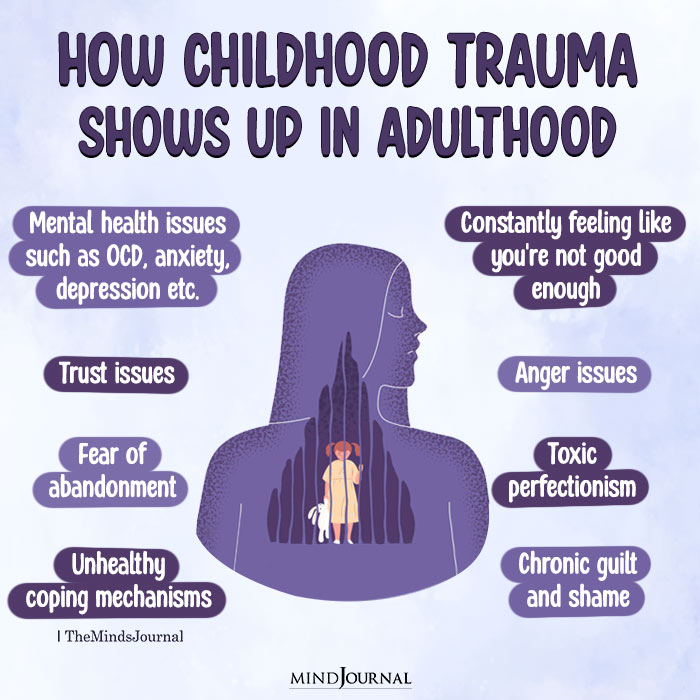
3. You suppress your emotions a lot.
You have become so used to not opening up about your feelings from a young age, that you don’t know what it feels like to be vulnerable in front of people you love. Since your parents always relied on you for help and support, you ended up shoving your feelings deep down in your heart.
You have become an expert in burying your anger, pain, sadness, resentment, hopes, and dreams, and even after turning into an adult, you have no idea how to deal with all your emotions. More often than not, emotional suppression like this leads to psychological and mental disorders, emotional outbursts, and even chronic diseases.
Related: Emotionally Immature Parents: 7 Signs You Were Raised By One
4. You judge your value on the basis of your achievements and accomplishments.
If you had parents who only thought about you, and praised you when you achieved something in life, then it’s natural that you will tie your self-worth and self-respect with your accomplishments only. You believe that failure is never an option, and perfectionism is the way to go.
After a point, a thought process like this takes a toll on you and your mental and emotional health. You might also be a people-pleaser, who is always looking for people’s approval and validation. In other words, you judge your worth on the basis of what and how much you can do for other people, and how useful you are.
How To Heal From Parentification?
If you are trying to break out from the cycle of parentification, then these reminders and tips might help you do so.
- Work towards reconnecting with your inner child.
- Learn to set strict personal and emotional boundaries with others.
- Know and understand that your feelings, opinions, needs, and happiness matter too.
- Stop seeing yourself as the sole caretaker and peacekeeper of the family.
- Practice self-care, and self-compassion.
- Focus on creating genuinely supportive and meaningful relationships.
- Accept who you are and love your authentic self.
- Accept and internalize that everybody else’s happiness is not your responsibility.
- Work towards letting go of the shame, and guilt you have been carrying for so many years.
- Teach yourself what your parents couldn’t teach you.
- Know that it’s okay to trust and lean on other people for support.
- Know that you are more than your achievements and accomplishments.
- Always remember that you did the best you could with what you had.
- Your childhood might have been a hard and dysfunctional one, but it’s over now and you’re allowed to heal and move on.
- Most importantly, always remember that you might not have been in charge of your past, but you ARE in charge of your present and future.
Experiencing parentification and trying to heal from it is not an easy journey. But does that mean you will live the rest of your life feeling guilty, shameful, tired, and deprived of happiness?
Related: Reparenting: 3 Ways To Heal your Inner child
Your answer to this question will decide the course of your life, and most importantly, happiness.
Want to know more about parentification? Check this video out below!
Frequently Asked Questions (FAQs)
Is parentification mental abuse?
Yes, parentification is indeed a form of mental and emotional abuse, and also violates and disrespects your boundaries.
What is spousification of a child?
Spousification of a child happens when a single, widowed or married parent treats their child like their spouse. This happens mostly to single parents rather than married parents, and mother-son spousification is way more common than father-daughter one.
Is parentification a gendered issue?
Yes, parentification can be considered a gendered issue since girls are more at risk of being parentified compared to boys. However, that does not mean boys don’t experience this at all, it’s just that the chances might be lesser.
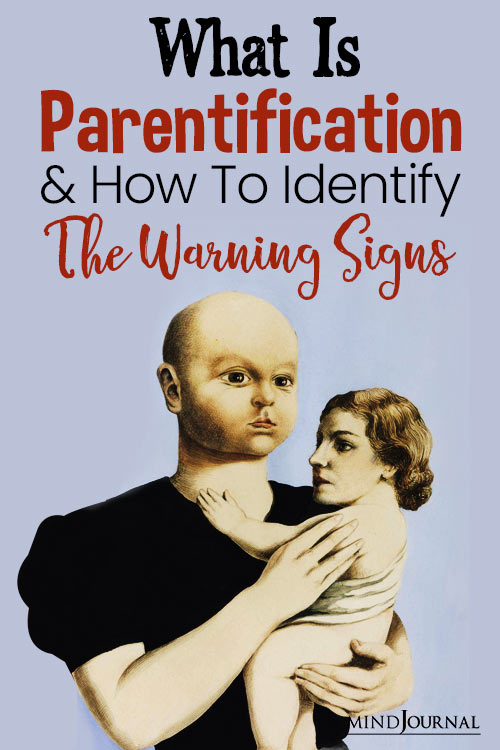
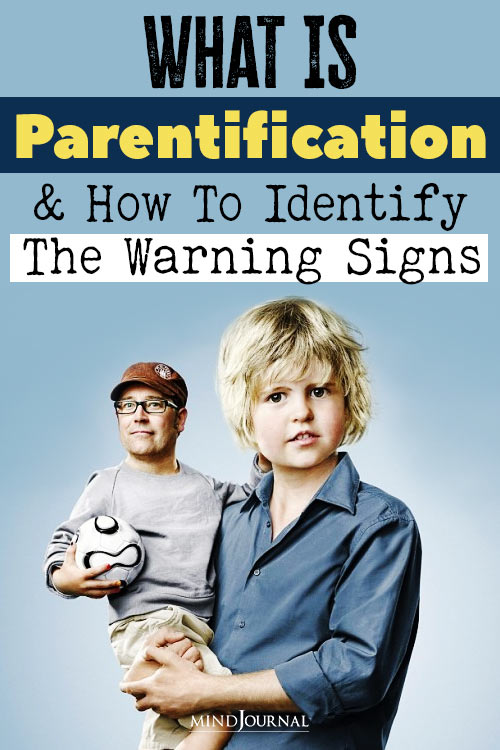
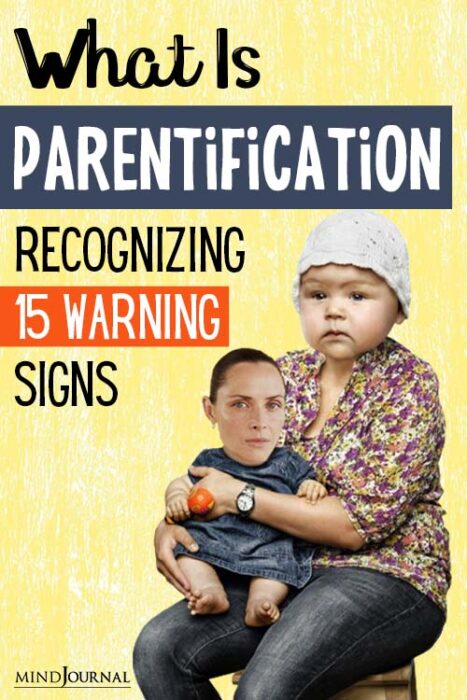
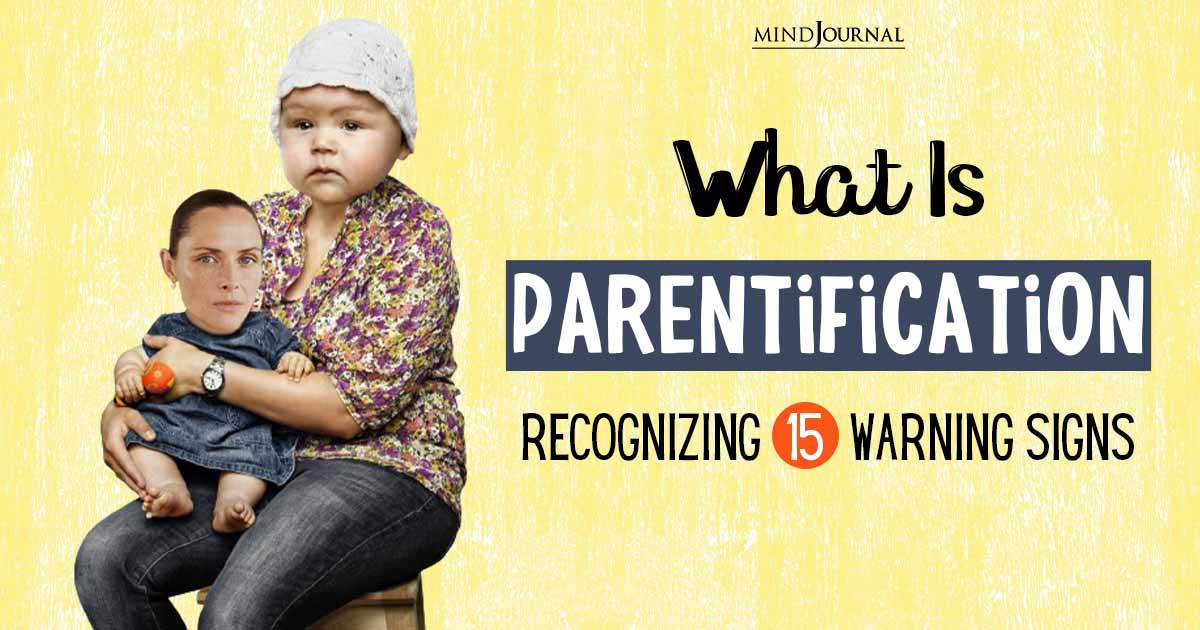







Leave a Reply
You must be logged in to post a comment.